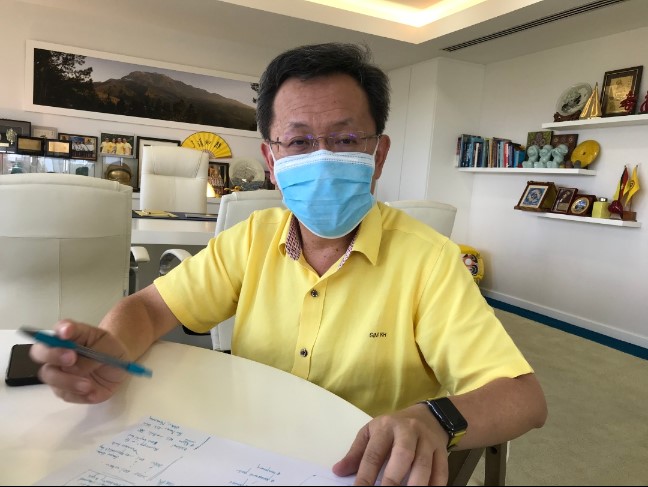KUALA LUMPUR, Jan 10 – Sarawak has reported more than 30 new presumptive Omicron cases, Dr Sim Kui Hian said, in addition to seven previously reported local infections of the Covid-19 variant.
The Sarawak deputy chief minister said last Saturday that the over 30 presumptive Omicron cases were detected within hours via PCR tests funded by the state government, pending confirmation by time-consuming genome sequencing by Universiti Malaysia Sarawak (Unimas). RT-PCR tests, which are faster than sequencing, can flag probable Omicron infection through S-gene target failure, where one of the three target genes is not detected.
Dr Sim noted that the seven locally transmitted Omicron cases in Sarawak – previously reported by Health Minister Khairy Jamaluddin last January 6 – took three to four weeks for the variant to be confirmed through genome sequencing. These seven cases, according to the Sarawak state minister, were imported by family members from West Malaysia and abroad; Khairy said then that some of the patients did not have international travel history or exposure to positive Omicron cases.
“Omicron a lot more infectious than Delta (expect more to get infected) though less severe,” Dr Sim wrote on Facebook.
“Understand from local medical experts that those with symptomatic Omicron typically has fever, cough, sore throat, lethargic [sic] and myalgia (muscle pain), but one prominent different [sic] from Delta is no loss of taste or loss of smell.”
The Sarawak state public health, housing and local government minister noted that Omicron has a much shorter incubation period at one to two days, compared to five to seven days with the Delta variant.
With Delta, people are no longer infectious after 10 to 14 days, but the contagious period for Omicron is shorter at five to seven days, Dr Sim said.
He urged Sarawakians to ensure good ventilation of indoor spaces, to avoid crowded public places, to use a medical mask (like N95, KN95, or KF94), and to regularly self-test for Covid-19 through antigen rapid tests, especially before attending social gatherings. Tests should be taken one to two hours before the event, not just a day or two earlier.
Dr Sim also said one should self-isolate with mild symptoms, even if antigen rapid test results are negative.
“Remember symptoms of Omicron variant infection could be as mild as runny nose, blocked nose, sneezing, sore throat, itchy throat, dry cough or just feeling tired. If you have these symptoms, assume you have Omicron variant infection.”
He further urged people to get their third Covid-19 vaccine dose or a booster, saying that heterologous vaccination for non-Pfizer vaccine recipients was more effective than taking three doses of the same coronavirus vaccine.
“Mix-and-match regime is best! Mix-and-match regime (except 3 doses of Pfizer) is the best vaccine regime that will help us sail through the Covid-19 pandemic storm.”
Dr Sim added that a 100 semi-permanent beds have been set up in a field hospital at Sibu Hospital, costing Sarawak’s state disaster management committee (SDMC) about RM1.5 million.
“Much improved version of canvas-based Military Field Hospital as seen in SGH Kuching or Miri Hospital,” he said. “Timely in the face of upcoming Omicron surge locally.”
Sarawak Studying Covid-19 Vaccination for Three- To Five-Year-Olds
Dr Sim said Sarawak medical experts are currently monitoring emerging global scientific data on Covid-19 inoculation for children aged three to five years, after Malaysia’s National Pharmaceutical Regulatory Agency (NPRA) approved a lower dosage of Pfizer-BioNTech’s coronavirus vaccine for children aged five to 11 years.
USA Today reported Thursday that test results on Pfizer’s Covid-19 vaccine for children aged two to five would only be available in late March or early April, as earlier studies showed that a lower dose given to these children didn’t give as much immune protection as shots given to other age groups.
Hence, the pharmaceutical company plans to test a third vaccine dose on kids aged two to five years eight weeks after the first two jabs, with a Pfizer official saying it could be a three-dose vaccine.
Khairy said last Thursday that the paediatric Covid-19 vaccination drive under the National Covid-19 Immunisation Programme (PICK) will be launched after discussions with Pfizer on the vaccine delivery schedule.
“Will continue to work closely with YBKJ and PICK so that Sarawak can roll out the program as soon and as fast as possible (thanks to Sarawak spirit of solidarity, we are the fastest and among the highest in Dose 1 & 2 for adults and 12-18yo as well as Booster Dose for adults under PICK in Malaysia),” Dr Sim said Saturday.
Sarawak has administered third Covid-19 vaccine or booster doses to 45 per cent of its total population as of January 8, the second highest coverage in the country after Kuala Lumpur’s 50 per cent.
National coverage with additional vaccine doses is at about 24 per cent.








